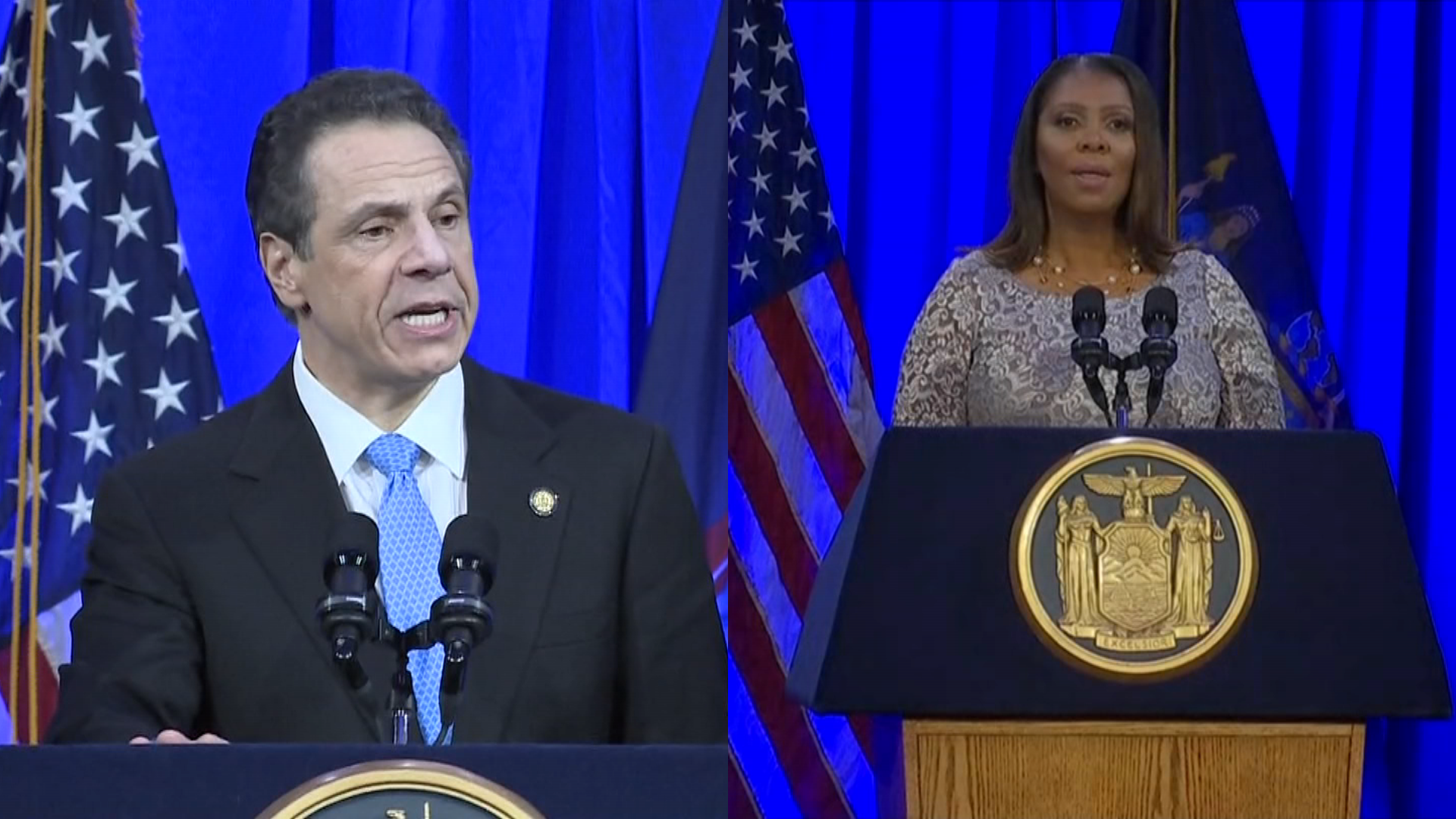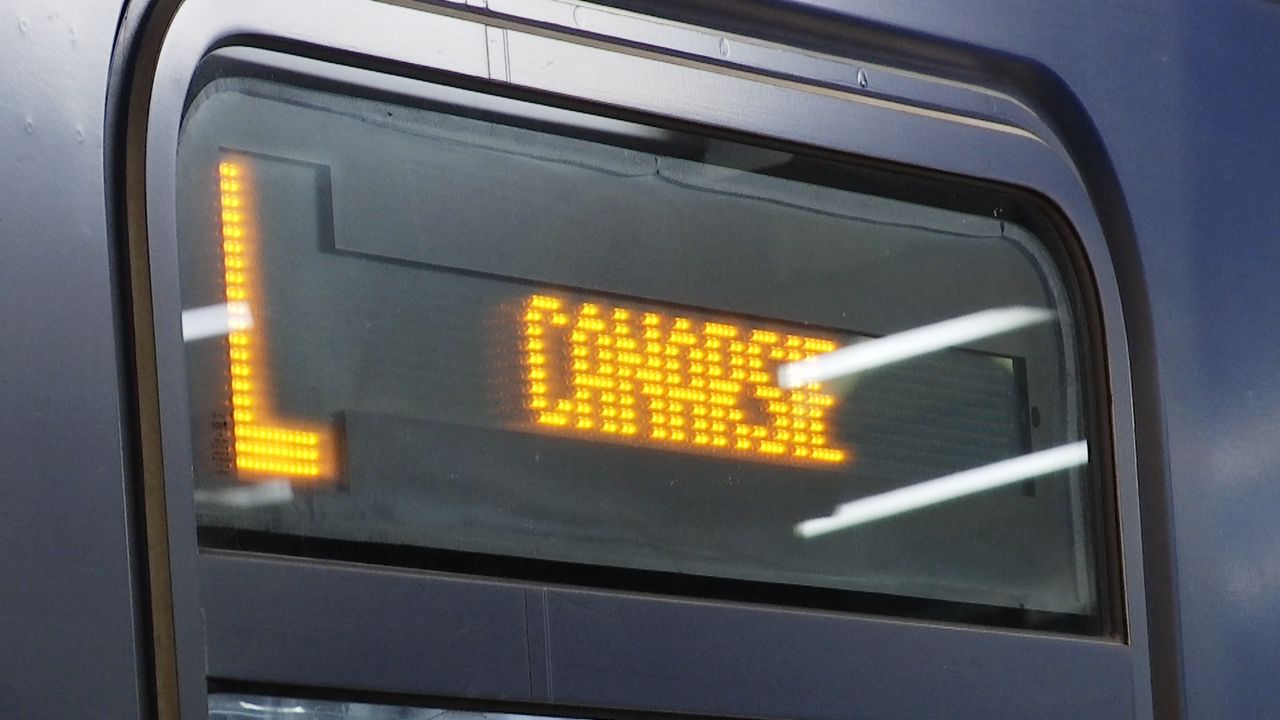The shutdown of L train service between Brooklyn and Manhattan may not happen after all, and the city rolled out a program for half-priced MetroCards — but with some serious restrictions. Here's what else you may have missed in New York politics this week.
PARTY ON ELLIS ISLAND

(Gov. Andrew Cuomo and Attorney General Letitia James speaking at their inauguration ceremonies Tuesday night on Ellis Island).
Two of New York's top elected officials, Gov. Andrew Cuomo and Attorney General Letitia James, were sworn into office Monday evening, and celebrated a day later at their inauguration ceremonies on Ellis Island.
Why it matters:
For James, the inauguration marked the beginning of her tenure as New York attorney general. She is now the first black woman to hold statewide elected office in New York history, and she will have broad jurisdiction to investigate the Manhattan-based Trump Organization, Trump Foundation, and the Trump campaign.
For Cuomo, meanwhile, the inauguration marked the beginning of his third term in office, one in which he will be under pressure to deliver on many items on the progressive wish list now that Democrats control the state government.
SOURCES: CUOMO WOULD ENDORSE BIDEN IF HE RUNS FOR PRESIDENT
(Gov. Andrew Cuomo, left, and former Vice President Joe Biden are longtime friends — and that may mean the New York governor will endorse Biden for a White House bid).
Sources say New York Gov. Andrew Cuomo will endorse former Vice President Joe Biden if he gets in the race. The two are longtime friends and allies, and Cuomo reiterated his support for Biden in a radio interview Wednesday, saying he has "the best case" of any potential presidential candidate.
Why it matters:
Although he has often denied it, Cuomo has shown a national focus while governor of New York, leading to speculation that he wants to run for president in 2020. An endorsement of Biden, then, would likely mean the governor would not run for the White House — although he didn't rule out running on a ticket with Biden as vice president this week.
GET READY FOR A FEBRUARY ELECTION
(Remember these ballot boxes? New Yorkers will be heading back to them in February for a special election).
It's official: New York City residents will head back to the ballot box 112 days after they voted in the miderm elections.
Mayor Bill de Blasio signed a proclamation Wednesday that set February 26 as the date of the special election for Public Advocate.
Why it matters:
The special election is for a position viewed as a watchdog in city government — although its powers are limited — but the election is also seen as a possible preview of the 2021 mayor's race. Many of the candidates running for Public Advocate are expected to try to succeed Bill de Blasio. Also, candidates cannot run on traditional political lines such as Democrat or Republican, so that's leading to some interesting ballot line names:
With more than a dozen Democrats expected to be in the race, a Republican could win among the crowded field and hold citywide office for the first time since 2007.
JUDGE TEMPORARILY HALTS BILL TO REGULATE HOME-SHARING SITES
(Airbnb and other home-sharing sites got a legal reprieve from New York City regulations this week).
Airbnb is celebrating. The online vacation and short-term apartment rental company won a victory in court Thursday, as a federal judge temporarily blocked a law that would have required Airbnb and similar companies hand over detailed information about listings to the city.
Why it matters:
The city was demanding the address of each rental and the name of the apartment host, as well as the length of the stay. Airbnb and Homeaway.com argued that the law violated the Fourth Amendment's protection against illegal searches and seizures.
Thursday's decision puts the brakes on the regulations, which were set to begin in February, ensuring the lawsuit has time to proceed.
A PLAN TO HALT THE "L-MAGEDDON"
(Get ready 15-month partial L train shutdown? Not so fast. Mary Altaffer/AP).
Remember that planned 15-month shutdown of the L train between Brooklyn and Manhattan that was to upend commutes for nearly a quarter million New Yorkers? Apparently the years of planning weren't truly necessary.
Gov. Andrew Cuomo made a surprise announcement Thursday with a new plan that would allow repairs to go on at nights and weekends and the trains to keep running.
Why it matters:
While the MTA Board still has to approve the plan, it provides a map to avoid the shutdown, just a few months before it was to begin. Some transit officials called it the most difficult service disruption they had ever planned for.
But that sudden reprieve came after the city, state, and the MTA spent millions of dollars over years to come up with transit alternative plans. Bike lanes were prepared, extra bus service was being rolled out, and some New Yorkers already changed jobs or apartments to avoid the looming commuting snarls. Some are wondering, then, why the new plan wasn't the first approach, pointing to this as the latest sign that the MTA is wasteful with its money.
HALF-PRICED METROCARDS — FOR A FRACTION OF NEW YORKERS
(Only a fraction of eligible low-income New Yorkers will get half-priced MetroCards anytime soon).
Mayor Bill de Blasio on Friday rolled out "Fair Fares," New York City's new program to offer half-priced MetroCards to low-income New Yorkers, but it is only going to help a fraction of the city's eligible residents at first.
The first in line to get the half-priced MetroCards are the 30,000 New Yorkers who receive cash assistance from the city. In April, the program will grow to include the 130,000 New Yorkers who receive food stamps.
Why it matters:
The numbers matter because there may be as many as 800,000 low-income New Yorkers who could be eligible for reduced-priced MetroCards, but they will not get them anytime soon. The mayor could not say Friday when other low-income residents may get the cards, or who would be eligible. The mayor argued the city needs time to roll out the program, but advocates and some elected officials have noted that the city agreed in budget negotiations about six months ago to fund the program.
For years, half-priced MetroCards have been a major item on many New Yorkers' wish lists given the constant fare hikes. Advocates say low-income New Yorkers pay too much of their income to use a service crucial to getting to work to make a living.
------
Looking for an easy way to learn about the issues affecting New York City and what local politicians are doing to solve them?
Listen to our "Off Topic/On Politics" podcast: Apple Podcasts | Google Play | Spotify | iHeartRadio | Stitcher | RSS



